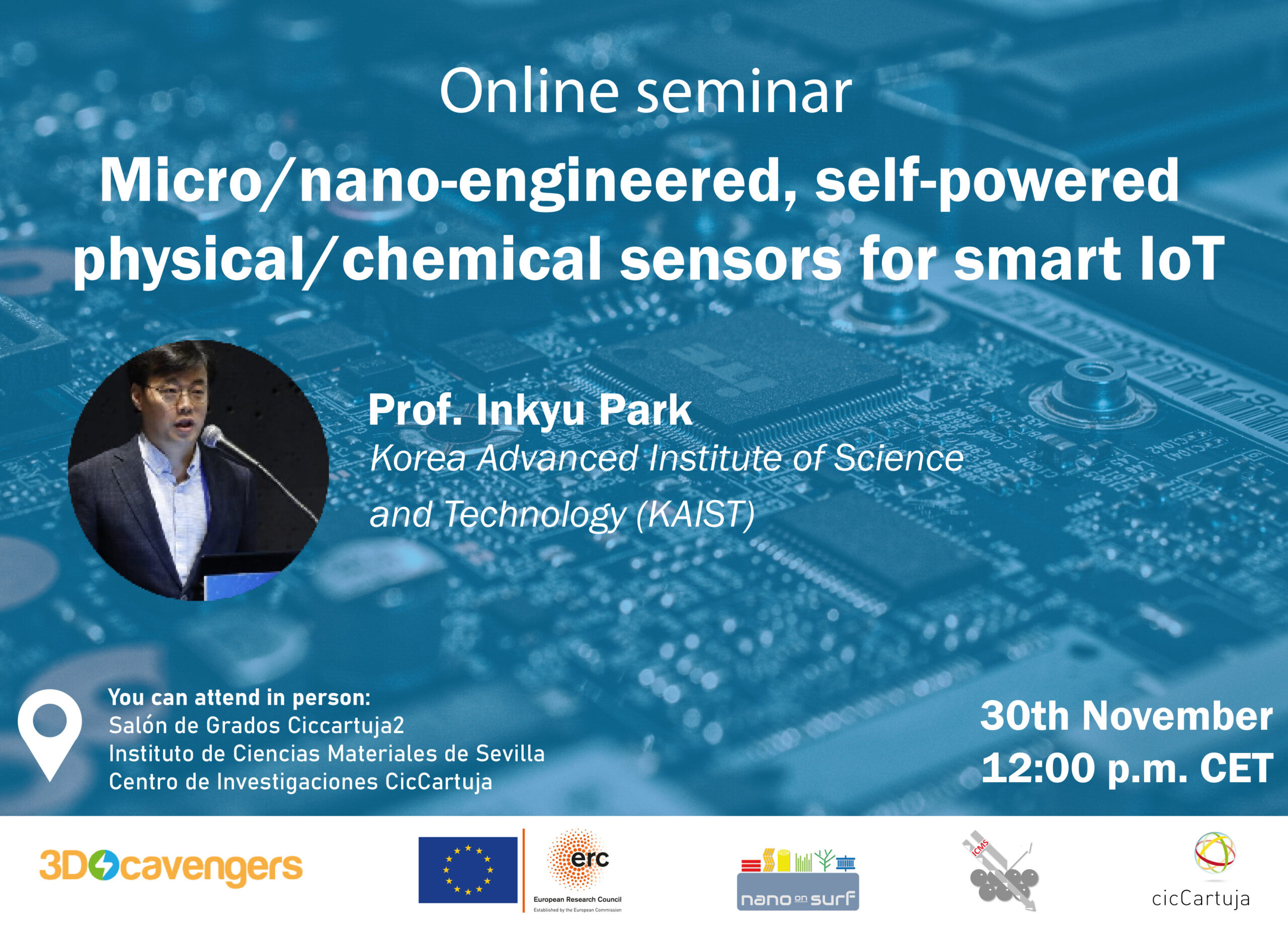News

On Wednesday 30 November, Prof. Inkyu Park will give an online lecture in the framework of the 3DScavengers project entitled Micro/nano-engineered, self-powered physical/chemical sensors for smart IoT.
You can attend online at this link or in person at the Instituto de Ciencias Materiales de Sevilla (ICMS). If you are not a member of this center to access the facilities you need to send your name, surname and ID to the following email (3dscavengers@icmse.csic.es).
Abstract
In the era of 4th industrial revolution, the importance of internet of things (IoT), which is the network of physical objects, has been rapidly growing. Among many core components for IoT, sensors measure physical parameters and status of objects including pressure, strain, temperature, pH, gas concentration, etc. As more sensors are deployed in numerous objects, especially in remote places, the power supply for the sensor operation is becoming a highly challenging issue. Accordingly, a number of low-power or self-powered sensors are being actively developed. In this talk, I will introduce recent development of self-powered physical and chemical sensors at our research group. In particular, the following research topics will be discussed: (1) wearable self-powered pressure sensor by integration of piezo-transmittance microporous elastomer with organic solar cell [1], (2) self-powered strain sensor based on the piezo-transmittance of a mechanical metamaterial [2], (3) self-powered H2 gas sensor based on chemo-mechanically operating palladium-polymer nanograting film [3], (4) self-powered gas sensor based on a photovoltaic cell and a colorimetric film with hierarchical micro/nanostructures [4], and (5) self-powered humidity sensor using chitosan-based plasmonic metal-hydrogel-metal filters [5].
References
[1] J. Choi, I. Park, et al., “Wearable self-powered pressure sensor by integration of piezo-transmittance microporous elastomer with organic solar cell”, Nano Energy 74, 104749 (2020)
[2] J. Gu, I. Park, et al., “Self-powered strain sensor based on the piezo-transmittance of a mechanical metamaterial”, Nano Energy 89, 106447 (2021)
[3] M.Seo, I.Park, et al., “Chemo-mechanically operating palladium-polymer nanograting film for self-powered H2 gas sensor”, ACS Nano 14, 12 (2020)
[4] K.Kang, I.Park, et al., “Self-powered gas sensor based on a photovoltaic cell and a colorimetric film with hierarchical micro/nanostructures”, ACS Applied Materials & Interfaces 12, 35 (2020)
[5] J. Jang, I. Park, et al., “Self-powered humidity sensor using chitosan-based plasmonic metal-hydrogel-metal filters”, Advanced Optical Materials 8, 1901932 (2020)
Biosketch
Prof. Inkyu Park received his B.S., M.S., and Ph.D. from KAIST (1998), UIUC (2003) and UC Berkeley (2007), respectively, all in mechanical engineering. He has been with the department of mechanical engineering at KAIST since 2009 as a faculty and is currently a full professor, vice department head, and KAIST Endowed Chair Professor. His research interests are nanofabrication, smart sensors for healthcare, environmental and biomedical monitoring, nanomaterial-based sensors and flexible & wearable electronics. He has published more than 140 international journal articles (SCI indexed) and 200 international conference proceeding papers, and holds more than 40 registered domestic and international patents in the area of MEMS/NANO engineering. He is a recipient of IEEE NANO Best Paper Award (2010), HP Open Innovation Research Award (2009-2012), KAIST Prize for Academic Excellence (2021), KAIST Grand Prize for Technology Innovation Award (2019), KAIST Endowed Chair Professorship (2017), and Outstanding Researcher Award from the Micro and Nano Systems Society of Korea (2020, 2022).